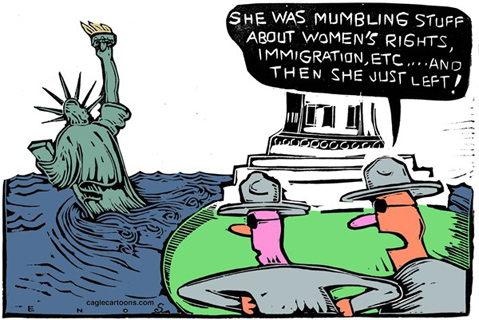Landing the DREAM
Immigration Snafus Causing a Brain Drain

Last month I had the opportunity to join a bipartisan faith-based pilgrimage to New York City to study up close aspects of the history of immigration in the United States. On the way to a stop on Ellis Island, I was struck by the majesty of the Statue of Liberty and how it would be the first sight immigrants would see after weeks or even months at sea. This first vision of the U.S. represented a new life filled with hope, freedom, and opportunity.
Today, more than 125 years after that statue first became a symbol of hope for people coming to start a new life, that dream is still alive in this nation of immigrants. And here along the Central Coast, that dream remains alive for the nearly one in five residents who were born outside the United States. From our rich agricultural fields to our high tech companies, immigrants play an important role in our local economy while remaining hopeful that one day they can become citizens of the country they call home.
Our nation’s strong immigrant history is one we can all be proud of. But our current immigration system is broken, and it’s holding our country and our economy back.
For example, many people come to our country as students to receive a high-quality education. At UCSB, a world-class research institute, we are training the best and brightest in some of the most advanced technologies in the world. We nurture them. We invest in them. But when these students graduate, we often can’t keep them here even when they want to stay.
Why would we train the leaders of tomorrow and then force them to leave? This not only hinders our local economy, but it also hurts our nation’s ability to compete in an ever-competitive global marketplace. We need policies that allow immigrants to not only pursue their education in the United States, especially in science, technology, engineering, and mathematics (STEM) fields, but to then have the opportunity to stay in the United States to pursue a career or start a business of their own. Many successful American companies like Google, Intel, or even the Central Coast’s own Transphorm have been started by immigrants. This is a resource the United States cannot afford to waste.
In Goleta and all along the Central Coast, we have innovative high-tech companies playing a central role in the growth of our local economy. I’ve met with the leaders of many of these companies and they have shared with me their struggles to retain a competitive workforce due to a frustrating and ineffective immigration system. We need to do everything we can to keep our graduates — to whom we’ve given the tools and the opportunities to succeed — here in our communities. There’s no reason we should continue to train our competitors’ workforce.
That’s why we need comprehensive immigration reform that will allow graduates the opportunity to stay in the United States if they choose and strengthen our workforce and economy. My colleagues in the Senate have already taken steps to advance comprehensive immigration reform farther than it has gone in the past several decades by passing legislation with strong bipartisan support of 68 votes.
That legislation, a product of months of compromise between liberals and conservatives and Republicans and Democrats, would help clear out the backlog of graduates waiting in limbo in our broken immigration system. It would create a duel visa program for students and increase the number of visas for high-skilled workers for future workforce needs, while developing annual immigration caps that take into account industry needs, trends, and unemployment.
It would also provide an expedited path to citizenship for students known as DREAMERs — those who were brought to the United States at a young age and call no other country their home — and creates a pathway to citizenship for other undocumented immigrants who have a clean criminal record, pay any back taxes and fees, and study English. The bill also addresses security along the border and improves our work visa system to address our economic needs down the road. All of these aspects of reform affect one another and highlight the complexities of the issue, which is why we must address all of these issues together in a comprehensive way.
Unfortunately, the Republican leadership in the House of Representatives has been hesitant at best in its approach to the issue, indicating only occasional interest and then only in a piecemeal approach. This is shortsighted and will continue to keep our economy and our neighbors in a place of limbo. That’s why I have been urging them to use the momentum behind the bipartisan Senate immigration reform bill and get to work now on passing comprehensive immigration reform this year. California can’t wait much longer and neither can our country or our economy. It is critical that we don’t let this opportunity slip away to fix a broken system that hurts our economy and thousands of Central Coast families.



